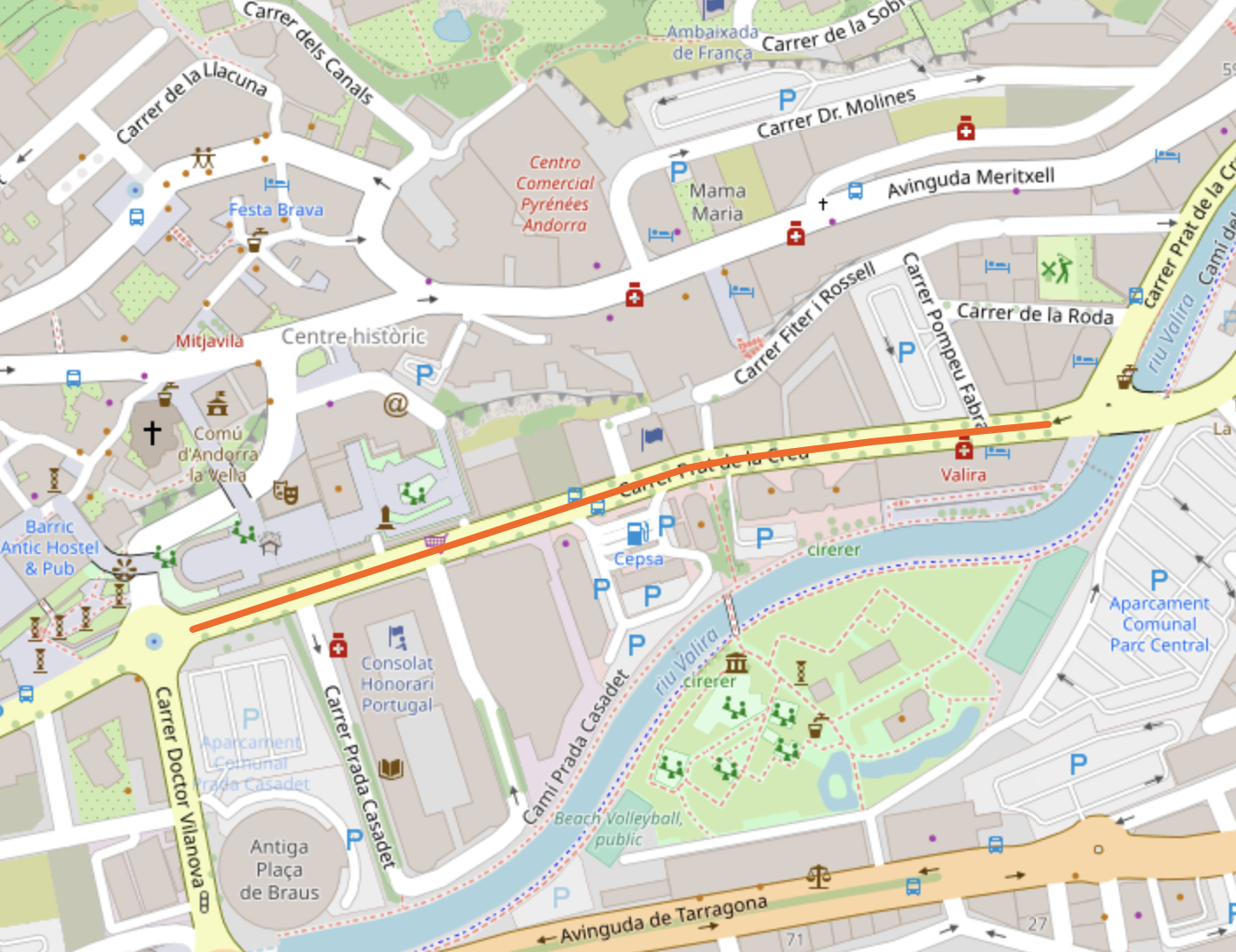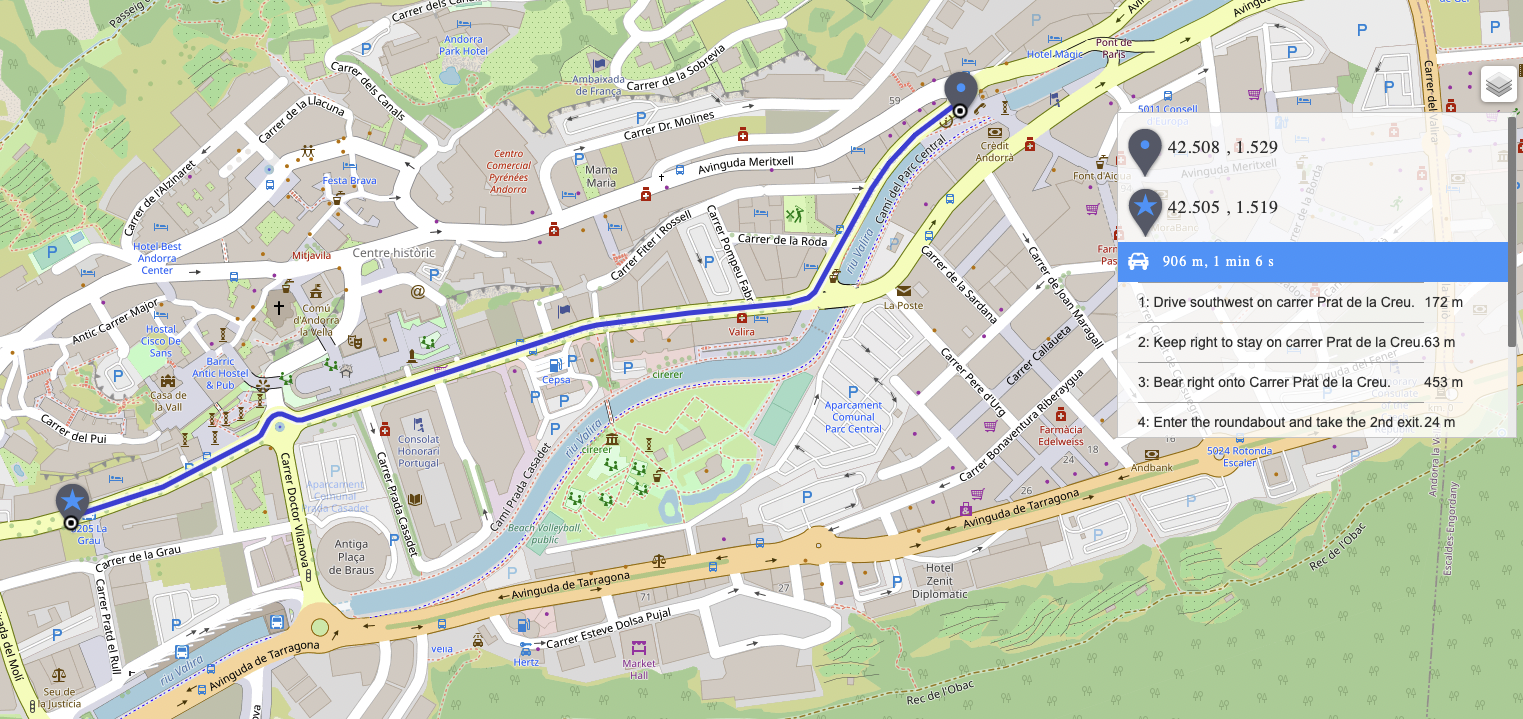Valhalla is an open source routing engine, with support for time-dependent routing and traffic.
It doesn't have at the moment any official step-by-step instructions on how to add traffic support, only a description of the feature: https://valhalla.readthedocs.io/en/latest/thor/simple_traffic/
This repository shows how to create an instance of Valhalla with both types of supported traffic information:
- Predicted traffic, used for time-based routing (e.g. find a route between A and B that leaves tomorrow at 12:00). This is done through a CSV which contains encoded speeds for a whole week for a given Valhalla graph edge.
- Live traffic, used for real-time decisions, and which can be set dynamically. This is done through a
traffic.tarfile that is memory mapped by Valhalla.
The files needed for the two types of traffic are generated using a new tool valhalla_traffic_demo_utils.
This has similar interface to existing Valhalla tools and makes use of data structures and algorithms in the Valhalla source code.
- Build the docker image
docker build -t valhalla-traffic .- (takes around 10 min, as it compiles valhalla and its dependency prime server + downloads and processes the OSM map for Andorra)
- Start container
docker run -p 8002:8002 -it valhalla-traffic bash- The port forwarding is important for the demos below
- Inside the container, start the server
LD_LIBRARY_PATH=/usr/local/lib valhalla_service /valhalla_tiles/valhalla.json 1 - Verify that Valhalla processed the traffic information correctly, by querying the Valhalla graph edge which we updated (or using the interactive demo in the next step):
curl http://localhost:8002/locate --data '{"locations": [{"lat": 42.506709, "lon": 1.523623}], "verbose": true}' | jq
One of the ways returned by the query should contain a non-empty predicted_speeds array for predicted traffic, and a non-empty live_speed object for live traffic. This means that Valhalla has the traffic information available.
Example:
[
{
"input_lon": 1.523623,
"input_lat": 42.50671,
...
"edges":[
{
"predicted_speeds":[6, 6, 6, 6, 6, 6, ... ],
"edge_info":{
"way_id":173167308,
...
},
"live_speed": {
"congestion_2": 0.03,
"breakpoint_1": 1,
"congestion_1": 0.02,
"speed_1": 40,
"congestion_0": 0,
"speed_2": 40,
"breakpoint_0": 1,
"speed_0": 40,
"overall_speed": 40
}
...
- Check the interactive demo (uses the locally running instance of Valhalla): https://valhalla.github.io/demos/routing/index-internal.html#loc=15,42.510609,1.534503
- Left click to place origin / destination for routing
- Right click to query node/edge info
- Do a live update of the traffic speeds and check how it is picked up automatically:
- For some reason, the tar file has to be customized before starting the service in order for the changes to be picked up automatically. Probably has something to do with how the memory mapping works.
- Do a dummy customization with live speed 0, so basically unsetting live speeds:
valhalla_traffic_demo_utils --config /valhalla_tiles/valhalla.json --update-live-traffic 0 - Restart the service:
LD_LIBRARY_PATH=/usr/local/lib valhalla_service /valhalla_tiles/valhalla.json 1 - Confirm that live speeds are not available
curl http://localhost:8002/locate --data '{"locations": [{"lat": 42.506709, "lon": 1.523623}], "verbose": true}' | jq | grep overall_speed - Customize with new values
valhalla_traffic_demo_utils --config /valhalla_tiles/valhalla.json --update-live-traffic 30 - Check the live speeds again, should be available now
curl http://localhost:8002/locate --data '{"locations": [{"lat": 42.506709, "lon": 1.523623}], "verbose": true}' | jq | grep overall_speed
The predicted traffic for the following OSM way is slowed as part of the Dockerfile commands: https://www.openstreetmap.org/way/173167308#map=17/42.50676/1.52457

As live traffic has priority over predicted traffic, make sure all live traffic speeds are set to 0, so they are ignored:
valhalla_traffic_demo_utils --config /valhalla_tiles/valhalla.json --update-live-traffic 0
When requested simple, non-time-dependent routing, Valhalla uses the way:

When requested time-dependent routing (Can be set in routing options in the demo), Valhalla avoids the way:

For predicted traffic, speeds must be higher than 5 Km/h to be taken into account. Anything lower than that is considered noise.
The free flow and constrained flow speeds are used by default by the routing API.
In order to use the predicted traffic information, the date_time parameter needs to be set in the route request.
Check the GetSpeed function in baldr/graphtile.h for validation of live traffic data.
curl http://localhost:8002/route --data '{"locations":[{"lat":42.505884,"lon":1.520732},{"lat":42.50885,"lon":1.528551}],"costing":"auto","directions_options":{"units":"meters"}}' | jq
Decode polyline6: http://valhalla.github.io/demos/polyline/
curl http://localhost:8002/sources_to_targets --data '{"sources":[{"lat":42.505884,"lon":1.520732},{"lat":42.50885,"lon":1.528551},{"lat":42.508282,"lon":1.521729}], "targets":[{"lat":42.506076,"lon":1.517199},{"lat":42.509775,"lon":1.525169},{"lat":42.501021,"lon":1.51791}],"costing":"auto","directions_options":{"units":"kilometers"},"date_time":{"type":1,"value":"2021-08-30T23:50"}}' | jq
curl http://localhost:8002/isochrone --data '{"locations":[{"lat": 42.506709, "lon": 1.523623}],"costing":"auto","contours":[{"time":5,"color":"ff0000"}],"date_time":{"type":1,"value":"2021-09-30T23:50"}}' | jq
View isochrone: http://geojson.io/
Used to match a single point to the nearest road: (click on the map, get a green point -> click on the green point to get info) http://valhalla.github.io/demos/locate/
Or cmd line:
curl http://localhost:8002/locate --data '{"locations":[{"lat":42.505884,"lon":1.520732},{"lat":42.508282,"lon":1.521729}]}' | jq
curl http://localhost:8002/trace_route --data '{"shape":[{"lat":42.505884,"lon":1.520732,"type":"break"},{"lat":42.508282,"lon":1.521729,"type":"break"}],"costing":"auto","shape_match":"map_snap"}' | jq
curl http://localhost:8002/trace_attributes --data '{"shape":[{"lat":42.505884,"lon":1.520732,"type":"break"},{"lat":42.508282,"lon":1.521729,"type":"break"}],"costing":"auto","shape_match":"map_snap"}' | jq
Let's assume that the traffic information has to be generated based on some input data in the form of a list of raw acquired speeds for a given lat/lng point.
In order to get the valhalla way id of an array of lat/lng pairs, the following request can be used:
curl http://localhost:8002/trace_attributes --data '{"shape":[{"lat":<lat>,"lon":<lng>},{"lat":<lat>,"lon":<lng>}, ... ],"costing":"auto","shape_match":"map_snap","filters":{"attributes":["edge.names","edge.id", "edge.weighted_grade","edge.speed", "edge.way_id", "edge.length", "edge.traversability", "edge.density", "matched.distance_along_edge", "matched.edge_index", "matched.distance_from_trace_point"],"action":"include"}}' | jq
This will return for each point in the "shape" array an edge index, which can be used to get the way id from the same response.
After having the way id for each point, just follow the Dockerfile steps, ignoring the usage of the way_edges.txt mapping.
valhalla_traffic_demo_utils.cc needs to be compiled as part of the main cmake + make calls.
Due to this, I have added two custom CmakeLists, which change from time to time in the upstream repository. Because the Valhalla repository is updated frequently, in order to remove the risk of future the breaking changes, a fixed commit is used to build Valhalla.
The two required changed CmakeLists are as follows:
- The CMakeLists under
src/should add the microtar library, which is used byvalhalla_traffic_demo_utils:andtarget_include_directories(valhalla PUBLIC ${VALHALLA_SOURCE_DIR} ... ${VALHALLA_SOURCE_DIR}/third_party/microtar/srcadd_library(valhalla ${valhalla_src} ${VALHALLA_SOURCE_DIR}/third_party/microtar/src/microtar.h ${VALHALLA_SOURCE_DIR}/third_party/microtar/src/microtar.c) - The CmakeLists in the root of the project should also contain
valhalla_traffic_demo_utilsas part of thevalhalla_data_tools, for example:set(valhalla_data_tools valhalla_build_statistics valhalla_ways_to_edges valhalla_validate_transit valhalla_benchmark_admins valhalla_build_connectivity valhalla_build_tiles valhalla_build_admins valhalla_convert_transit valhalla_fetch_transit valhalla_query_transit valhalla_add_predicted_traffic valhalla_assign_speeds valhalla_traffic_demo_utils)